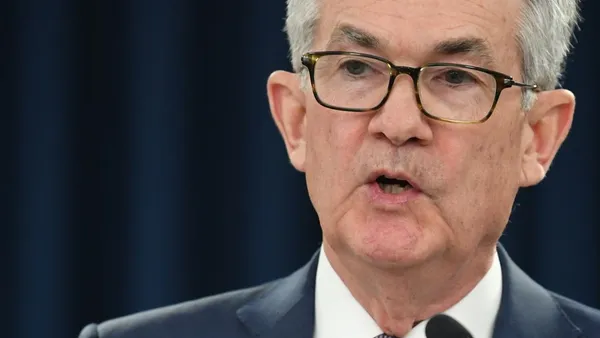Dive Brief:
- Pressures on profit margins from inflation, rising interest rates and slower economic growth could spell trouble for weaker companies that have raised capital through direct lending, according to S&P Global Ratings.
- “While direct lending continues to be a growing market that provides strong yields, relationship-driven lending (with better documentation and controls), speed of execution and more efficient forms of workout, the resilience of this market hasn't been truly tested in a protracted credit crisis,” S&P Global said.
- “One of the risks in the overall private debt market is that nobody is quite sure how big it is or who ultimately holds the risk given how the risk is distributed,” S&P Global said. “Problems in the private markets could ripple through to the more transparent and much larger syndicated market.”
Dive Insight:
For months CFOs planning to raise debt have had to track several disruptive trends, including the highest inflation in four decades, a reduction in record monetary stimulus and the risk that omicron or another COVID-19 variant will derail economic growth.
The private debt market has weathered recent headwinds and grown during the past decade as liquidity surged, many companies seeking capital spurned public markets and record-low interest rates prompted investors to search for yield.
Banks facing tougher regulation under the Dodd-Frank Act of 2010 have favored bigger borrowers, opening the way for private equity and other non-bank entities to lend to middle market borrowers.
During the past decade private debt assets under management worldwide have annually surged 13.5% to an estimated $1.21 trillion, and will probably swell to $2.69 trillion by 2026, according to Preqin.
When analyzing the private debt market, “it remains difficult to assess just how much long-term risk exists and how vulnerable the borrowers would be in the event of a credit crisis,” S&P Global said.
In order to gauge the health of the private debt market, S&P Global looked at the credit profile and performance of middle market (MM) companies that underlie collateralized loan obligations (CLOs).
MM CLOs are backed by loans to smaller companies that serve local and regional markets with comparatively narrow products or services, S&P Global said. “Most of the companies we reviewed have a weak or vulnerable business risk profile given their small size.”
The companies usually have close relationships with their lenders which, during the pandemic, smoothed negotiations over amendments to loan agreements and averted conventional default, according to S&P Global.
“This resulted in some MM CLO managers getting less than promised of their original security without adequate and offsetting compensation, which we considered to be selective defaults,” according to S&P Global.
About 94% of the companies that S&P Global reviewed were owned by private equity firms, and nearly 75% received a credit estimate score of “B-.”
“This isn’t surprising given the high degree of PE ownership,” S&P Global said.
“We assume financial sponsors generally look to maximize returns by extracting cash from their portfolio companies by issuing debt,” the rating firm said, adding “the financial risk profile for PE-owned companies is commensurate with those of highly leveraged companies.”
The median EBITDA for the MM companies was $24 million, while the median adjusted debt was about $175 million, S&P Global said. “The combination of highly leveraged financial risk and weak or vulnerable business risk resulted in credit estimate scores falling at the lower end of the credit spectrum.”
Pent-up consumer demand and greater business optimism improved earnings and balance sheets at MM companies in 2021, prompting more credit upgrades than downgrades, S&P Global said. The proportion of companies in MM CLOs rated “CCC” fell to 16% from 22% last year.
Still, “a slowdown in economic growth coupled with inflation pressures and rising interest rates — and the consequent pressure on margins — could weigh heavily on some weaker companies with low coverage ratios,” S&P Global said.















